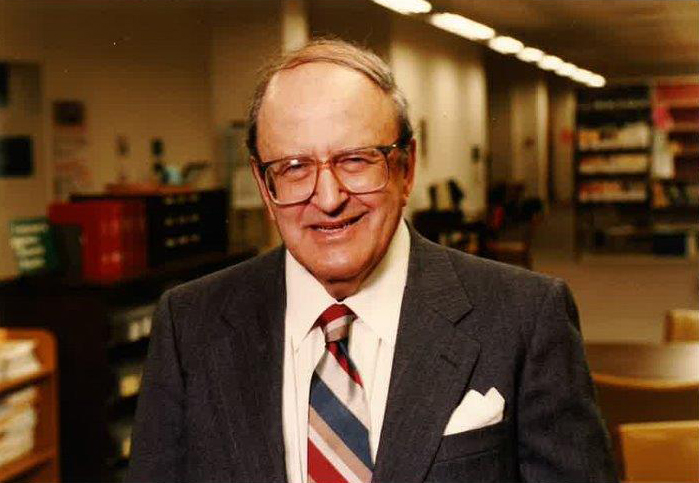
Biography
Harry Victor Jaffa was born in New York City on October 7, 1918, and died on January 10, 2015, in Pomona, California, his life thus spanning the presidencies of Woodrow Wilson and Barack Obama. The grandson of Jewish immigrants from what is now Poland, he grew up on Long Island. He married Marjorie Butler (who died in 2010) when they were both working in Washington, D.C., during World War II. They had two sons and a daughter.
The Education of Harry Jaffa
In college, Jaffa was a Golden Gloves boxer, and he was an ardent violinist until he became a student of Leo Strauss. Physical pursuits and music were thus at the core of his life, which blended spiritedness (thumos) and longing (eros) under reason (logos). He was an ardent bicyclist until late in his life. His friend and frequent intellectual sparring partner, William F. Buckley, Jr., caught his spirit well in a speech honoring him: “If you think it’s hard to argue with Harry Jaffa, try agreeing with him.”
Jaffa had a combative soul. He battled anti-Jewish discrimination at Yale, where he was a literature major, graduating in 1939. Hoping to study political philosophy for an academic career, he turned aside warnings about anti-Semitism in university employment.
Among his boyhood friends were Francis Canavan and Joseph Cropsey, who also became well-known political theorists.
In 1944, Jaffa moved to New York and became a student of Leo Strauss at the Graduate Faculty of the New School for Social Research, receiving his Ph.D. in 1951. His eulogy of his lifelong friend Cropsey described their wonder at their discovery of Strauss. Seven years of class and individual study with Strauss—five in New York, two in Chicago—persuaded Jaffa that Strauss was “the Socrates of our millennium.” Alluding to the well-known allegory from Plato’s Republic, Jaffa said that Strauss freed his disciples from their “cave” of “historicist dogma that we were all prisoners of our own time and place, and that we had no access to any truth outside of it.” The “microanalysis” of literature Jaffa learned at Yale served him well, but “with Strauss the microanalysis was always linked to a macroanalysis.”
Jaffa’s first book, Thomism and Aristotelianism: A Study of the Commentary by Thomas Aquinas on the Nicomachean Ethics (1952), a revision of his dissertation, displays two of the themes that would characterize his lifelong scholarly concerns—classical political philosophy, in particular Aristotle, and the tension between reason and revelation in Western civilization.
In 1946, chancing upon a copy of the Lincoln-Douglas debates in a used bookstore, Jaffa believed he saw therein the themes of Book I of Plato’s Republic—justice, power, persuasion, and philosophy. In doing so Jaffa “added the study of political speech to the study of great books, as a dimension of Straussianism.” The publication of Crisis of the House Divided: An Interpretation of the Issues in the Lincoln-Douglas Debates (1959) made its mark both on serious historians of the Civil War and on students of political philosophy.
Following twelve years at Ohio State University, Jaffa moved to the Claremont Colleges, where his thought was to undergo a decisive change. He taught from 1965 until 1989 at Claremont McKenna College and at Claremont Graduate University. He then became a distinguished fellow at the Claremont Institute, founded by several of his graduate students.
The Political World
Jaffa was part of a team of scholars under the aegis of the American Enterprise Institute tasked with giving policy advice to Barry Goldwater’s presidential campaign in 1964. In a memo to the campaign staff, he penned the most famous words of the campaign: “Extremism in the defense of liberty is no vice… moderation in the pursuit of justice is no virtue.” He wrote occasional speeches for Richard Nixon and Vice President Spiro Agnew (crafting the phrase “supercilious sophisticates”). He converted William F. Buckley and his succeeding editors of National Review into admirers of Abraham Lincoln, an important moment for the development of American conservatism. For Jaffa, “The salvation of the Republican Party, and of the country and of the world, will be changing the conservative movement to reflect the principles of Abraham Lincoln.” “We owe a debt of immeasurable gratitude to Harry Jaffa,” Justice Clarence Thomas declared, “for recovering for us the true Lincoln and for helping us to remember our sacred heritage.”
The Claremont “Turn”
At Claremont, Jaffa undertook a change of mind that led to a delay in his planned sequel to Crisis, namely A New Birth of Freedom, which was finally completed in 2000. The first indication of that change can be seen in his How to Think about the American Revolution: A Bicentennial Cerebration (1978). Here Jaffa openly broke with many former friends and argued that major conservative public intellectuals and scholars had fundamentally misunderstood the American founding.
While it attracted some, Jaffa’s brashness put off many others. For his students, however, such as those who conceived the Claremont Institute and The Claremont Review of Books, and went on to significant academic careers, his pugnacity inspired their own search for understanding. The spirited, intelligent, and unapologetic Jaffa reminds us of what it means to live a serious life.
